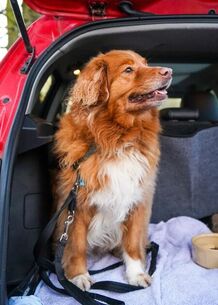Laurie Anne Walden, DVM  James Frewin via Unsplash James Frewin via Unsplash Motion sickness is common in dogs and cats and can cause significant anxiety in affected animals. The condition is usually associated with riding in a car, boat, or airplane. If your pet vomits during trips, contact your veterinarian for medical help. Causes Motion-related nausea is caused by stimulation of the vestibular system, a set of structures in the inner ear responsible for sense of balance and coordination of head and eye movements. Signals from the vestibular system are connected to the vomiting center in the brainstem. Motion sickness is probably related to sensory conflict when input from the eyes (what the animal sees) doesn’t match motion that the vestibular system detects.[1] Head movements that are jerky, inconsistent, or in the opposite direction of the body’s motion—all of which happen while riding in a vehicle—can trigger the neural signals that lead to vomiting.[2] Animals with motion sickness sometimes vomit before the vehicle is even moving because they’re anxious and scared. They’ve learned that riding in a vehicle makes them feel sick, so they develop fear of the vehicle itself, and that fear makes them vomit.[3] Anxiety that’s not related to motion sickness can also cause vomiting, so animals who are afraid of car rides for other reasons might vomit even if they don’t really have motion-related nausea. Symptoms Animals with motion sickness don’t always vomit. Some of the symptoms of nausea and anxiety are more subtle. Watch for these symptoms in dogs and cats:
Diagnosis Diagnosing motion sickness is usually pretty straightforward: vomiting that happens only in moving vehicles is motion sickness. A thorough history can help determine whether the animal has motion-related nausea, anxiety, or both. Vomiting that continues longer than the vehicle ride or is accompanied by other symptoms, like stomach pain, should be investigated further. Treatment Withholding food for a few hours before the animal travels is a good way to start but might only reduce the volume of vomit; it won’t help with anxiety. Puppies sometimes outgrow motion sickness,[1] especially if they receive positive-reinforcement training for vehicle rides. Training improves anxiety-related symptoms in some adult animals too. However, many animals need medicine to help them deal with motion sickness. Safe and very effective antinausea medicines for dogs and cats are available by prescription. A veterinarian can help decide whether a pet would benefit most from antinausea medicine, antianxiety medicine, or both. Motion sickness remedies for humans are available without a prescription, and some of these can be used in dogs and cats. However, never give your pet any motion sickness remedy without talking to your veterinarian first. Some of the products for humans have unwanted effects in animals. Many “natural” remedies are either untested or not effective in animals, and some might even be unsafe. References 1. Conder GA, Sedlacek HS, Boucher JF, Clemence RG. Efficacy and safety of maropitant, a selective neurokinin 1 receptor antagonist, in two randomized clinical trials for prevention of vomiting due to motion sickness in dogs. J Vet Pharmacol Ther. 2008;31(6):528-532. doi:10.1111/j.1365-2885.2008.00990.x 2. Graham H. Motion sickness in small animals: pathophysiology & treatment. Clinician’s Brief. June 2013. Accessed May 16, 2021. https://www.cliniciansbrief.com/article/motion-sickness-small-animals-pathophysiology-treatment 3. Coates JR. Motion sickness in animals. Merck Veterinary Manual. Updated March 2021. Accessed May 16, 2021. https://www.merckvetmanual.com/nervous-system/motion-sickness/motion-sickness-in-animals 4. Hickman MA, Cox SR, Mahabir S, et al. Safety, pharmacokinetics and use of the novel NK-1 receptor antagonist maropitant (Cerenia) for the prevention of emesis and motion sickness in cats. J Vet Pharmacol Ther. 2008;31(3):220-229. doi:10.1111/j.1365-2885.2008.00952.x Image source: James Frewin via Unsplash Comments are closed.
|
AuthorLaurie Anne Walden, DVM Categories
All
Archives
June 2024
The contents of this blog are for information only and should not substitute for advice from a veterinarian who has examined the animal. All blog content is copyrighted by Mallard Creek Animal Hospital and may not be copied, reproduced, transmitted, or distributed without permission.
|
- Home
- About
- Our Services
- Our Team
-
Client Education Center
- AKC: Spaying and Neutering your Puppy
- Animal Poison Control
- ASPCA Poisonous Plants
- AVMA: Spaying and Neutering your pet
- Biting Puppies
- Boarding Your Dog
- Caring for the Senior Cat
- Cats and Claws
- FDA warning - Bone treats
- Force Free Alliance of Charlotte Trainers
- Getting your Cat to the Vet - AAFP
- Holiday Hazards
- How To Feed Cats for Good Health
- How to Get the Most Out of your Annual Exam
- Indoor Cat Initiative - OSU
- Introducing Your Dog to Your Baby
- Moving Your Cat to a New Home
- Muzzle Training
- Osteoarthritis Checklist for Cats
- What To Do When You Find a Stray
- Our Online Store
- Dr. Walden's Blog
- Client Center
- Contact
- Cat Enrichment Month 2024
|
Office Hours
Monday through Friday 7:30 am to 6:00 pm
|
Mallard Creek Animal Hospital
2110 Ben Craig Dr. Suite 100
|
Site powered by Weebly. Managed by IDEXX Laboratories

 RSS Feed
RSS Feed